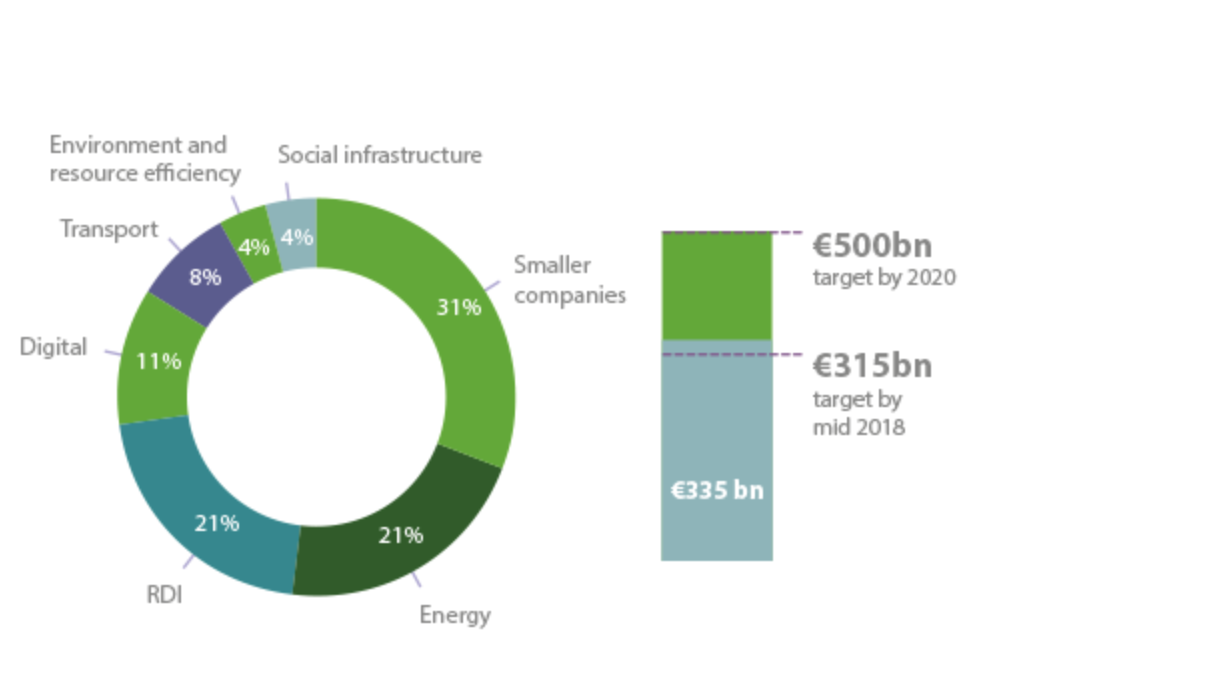:quality(80)/business-review.eu/wp-content/uploads/2015/07/European_flag_in_Karlskrona_2011.jpg)
For Romania, the EFSI funding approved by the European Investment Bank (EIB) Group stands at EUR 430 million as of July 2018. The investment EFSI finance is set to trigger in Romania amounts to EUR 1.8 billion, which ranks the country on the 22nd place out of the 28 EU member states.
The European Commission and the European Investment Bank (EIB) Group have met their target to mobilise EUR 315 billion in additional investment under the Investment Plan for Europe, also known as the Juncker Plan.
Backed by a budget guarantee from the European Union and own resources from the EIB Group, 898 operations have been approved, which are expected to trigger a total of EUR 335 billion in investment across the 28 EU member states. This exceeds the original goal of EUR 315 billion set in 2015 when the EFSI was launched. This helped close the investment gap left as a result of the financial and economic crisis. A total of 700,000 small and medium-sized companies are set to benefit from improved access to finance.
Given the EFSI’s success, the European Council and the European Parliament agreed last year to extend its duration and capacity to EUR 500 billion by the end of 2020.
“The Juncker Plan has proven to be a success. We surpassed the original EUR 315 billion investment target and the European Fund for Strategic Investments is set to create 1.4 million jobs and increase EU GDP by 1.3 percent by 2020. We have financed projects which without the EFSI would not have been possible, and all without creating new debt: two thirds of the investment comes from the private sector. From financing job-training for refugees in Finland to renewable energy in Greece to farming in Bulgaria – we will continue to use the EU budget for what it does best: to catalyse growth,” said President Jean-Claude Juncker said.

Commission Vice-President Jyrki Katainen, responsible for Jobs, Growth, Investment and Competitiveness, said: “Today’s milestone proves the EU is a front runner in using private money for the public good. By adopting a market-driven approach and making strategic use of the EU budget, we have supported hundreds of innovative investment projects and helped thousands of small businesses to scale up. And as a result, we have improved Europe’s competitiveness and already supported at least 750,000 jobs across the EU. Thanks to the Investment Plan and to the efforts Member States have implemented in national structural reforms, the investment outlook in Europe is bright.”
European Investment Bank Group President Werner Hoyer said: “I like to call the EIB the good news institution, but even by our standards today’s achievement makes me especially proud. We did what many three years ago said was impossible. Triggering EUR 315 billion in new, additional investment – most of it from the private sector – was never going to be an easy task. We demonstrated that it can be done thanks to the excellent cooperation between the EIB and the European Commission; the help and support of Council and European Parliament; and to the EU Bank’s experience, versatility, and dedication. The last three years have transformed the way Europe finances its priorities. We now have the key to making scarce public resources achieve more for Europe’s economy and for its citizens by crowding in private investment. Many people now consider the Juncker Plan model a winner and there is no going back from it.”
According to estimates of the EIB’s Economics Department and the Commission’s Joint Research Centre (JRC), EFSI operations have already supported more than 750,000 jobs with the figure set to rise to 1.4 million jobs by 2020 compared to the baseline scenario. In addition, calculations show that the Juncker Plan has already increased EU GDP by 0.6 percent and it is set to increase EU GDP by 1.3 percent by 2020. Two thirds of the EUR 335 billion raised comes from private resources, meaning that the EFSI has also met its objective of mobilising private investment.
When measured against the size of the economy, the biggest impact was seen in the countries most affected by the economic crisis, such as Cyprus, Greece, Ireland, Italy, Portugal, and Spain.
While the direct investment impact is particularly high in those countries, the calculations found that cohesion regions (mostly Eastern European countries) are likely to benefit more from a long-term effect.
Through the Juncker Plan, the EIB Group finances operations that are riskier than its average investments. Often, EFSI-backed projects are highly innovative, carried out by small companies without a credit history, or they pool smaller infrastructure needs by sector and geography.



:quality(80)/business-review.eu/wp-content/uploads/2024/07/vodafone-RO.jpg)



:quality(80)/business-review.eu/wp-content/uploads/2024/06/22C0420_006.jpg)

:quality(80)/business-review.eu/wp-content/uploads/2024/06/COVER-1-4.jpg)



:quality(80)/business-review.eu/wp-content/uploads/2024/06/br-june-2.jpg)
:quality(50)/business-review.eu/wp-content/uploads/2024/07/BeFunky-collage-37-scaled.jpg)
:quality(50)/business-review.eu/wp-content/uploads/2024/07/04_ThinkPad_T14s_6_Business_Coworking.jpg)
:quality(50)/business-review.eu/wp-content/uploads/2024/07/Iulia-Surugiu-scaled.jpg)